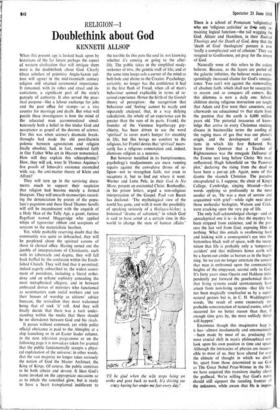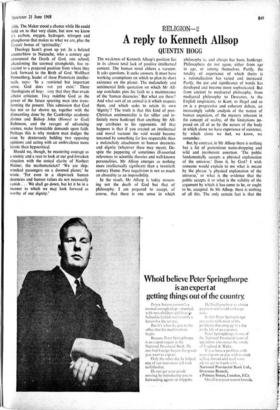Doublethink about God
RELIGION-1
KENNETH ALLSOP
When this present age is looked back upon by historians of the far future perhaps the aspect of western civilisation that will intrigue them most is the doublethink about God. Clearly (these scholars of primitive Anglo-Saxon cul- ture will agree) in the mid-twentieth century religion still retained ceremonial importance. It remained, with its robes and ritual and in- cantations, a significant part of the state's panoply of authority. It also served the prac- tical purpose—like a labour exchange for jobs and the post office for stamps—as a visa counter for marriage and death. But what will puzzle these investigators is how the mind of the educated man accommodated simul- taneously both a belief in this titular God and acceptance as gospel of the decrees of science. For this was when science's dramatic break- throughs had made the old post-Darwin polemic between agnosticism and religion finally obsolete; had, in fact, rendered faith in Our Father Who art in Heaven nonsensical. How will they explain this schizophrenia? How„ they will ask, were St Thomas Aquinas's five proofs of Jehovah's existence reconciled with, say, the anti-matter theory of Klein and Alfrei?
They will turn up in the surviving docu- ments much to support their suspicion that religion had become merely a formal liturgism. They will unearth manuscripts record- ing the denunciation by priests of the popu- lace's paganism and these Dead Thames Scrolls will still be incandescent with the anguish of a Holy Man of the Telly Age, a gaunt, furious flagellant named Muggeridge who applied whips of typewriter ribbon and scorpions of sarcasm to the materialistic heathen.
Yet, while probably reserving doubt that the community was quite so debauched, they will be perplexed about the spiritual canons of those in clerical office. Having sorted out the jumble of interpretations of Christianity, each with its tabernacle and dogma, they will fall back baffled by the confusion within the Estab- lished Church. They will find that it permitted, indeed eagerly subscribed to, the widest assort- ment of postulates, including a literal ortho- doxy and an urbane sophistry conceding the most metaphysical allegory, and in between embraced droves of ministers who functioned as scoutmasters cum social workers and ran their houses of worship as citizens' advice bureaux, the revivalism they most welcomed being that of rock 'n' roll. And they will finally decide that there was a tacit under- standing within the media that there should be no showdown between God and his rivals.
It passes without comment, yet while polite official obeisance is paid to the Almighty at a ship launching or in an Easter leader column, in the next television programme or on the following page it is nowadays taken for granted that the public fundamentally accepts a physi- cal explanation of the universe; in other words, that the vast majority no longer takes seriously the notion of God the Master Architect, the King of Kings. Of course, the public contrives to be both atheist and devout. It likes God's name invoked on the appropriate occasions so as to inhale the sanctified glow, but is ready to have a heart transplanted indifferent to
the terrible fix this puts the soul in, not knowing whether it's coming or going to the after- life. The public takes in the simplified ready- reckoner of DNA, the genetic stuff of life; and at the same time keeps safe a corner of the mind as bolt-hole and shrine to the Creator. Psychology, certainly, no longer has the confidence it bad in the first flush of Freud, when all of man's behaviour seemed explicable in terms of re- ceived experience. Hence the birth of the Gestalt theory of perception: the recognition that behaviour and 'feeling' cannot be neatly and separately analysed, that, in a way defying calculation, the whole of an experience can be greater than the sum of its parts. Frankl, the founder of the Viennese logotherapy psy- chiatry, has been driven to use the word 'spiritual' to cover man's hunger for meaning in life; but this brings no comfort to the religious, for Frank! denies that 'spiritual' neces- sarily has a religious connotation and, indeed, dismisses religion as a neurosis.
But however modified in its bumptiousness, psychology's readjustments are mere running repairs against the convulsive throes of re- ligion—not to strengthen faith, not even to recapture it, but to find out where it went. Werner and Lotte Pelz, in their God Is No More, present an existential Christ. Bonhoeffer, in his prison letters, urged a non-religious interpretation of the Gospel. Paul van Buren has declared : 'The mythological view of the world has gone, and with it went the possibility of speaking seriously of a Heilsgeschichte: a historical "drama of salvation," in which God is said to have acted at a certain time in this world to change the state of human affairs.'
TB be glad when the wife stops being on strike and goes back to work. It's driving me crazy having her under me feet every day.'
There is a school of Protestant 'religionless' who see 'religious activities' as thrir only re- maining logical function—the tail wagging the God. Altizer and Hamilton, in their Radical Theology and the Death of God, deny that the 'death of God' theologians' posture is now `really a complicated sort of atheism.'-They are resigned to Godlessness, yet pray for the return of God.
Naturally none of this refers to the ardent believer. Because, as the layers are peeled off the galactic infinities, the believer makes corre- spondingly increased claims for God's omnipo- tence. You can't win against the stonewalling of absolute faith, which shall not be susceptible to reason and so conquers all comers. But this dilemma is now a daily one. School- children during religious instruction are taught that Adam and Eve were their ancestors, and afterwards see educational ry that starts from the premise that the earth is 6,000 million years old. The pictorial treasuries of know- ledge that arrive in every Christmas stocking discuss in businesslike terms the cooling of the raging mass of gas that was our planet's origin, and the development of condi- tions in which life first flickered. We learn from Qumran that a Teacher of Righteousness was the renegade Deliverer of the Essene sect long before Christ. We read, unflustered, Hugh Schonfield on 'the Passover plot,' declaring the rising from the dead to have been a put-up job. Again, none of this daunts the staunch Christian. The paradox encapsulated is, I suppose, the choir of King's College, Cambridge, singing Messiah—those words applying so profoundly to the most secular of us, 'He was a man of sorrow and acquainted with grief—while right next door those molecular biologists, Watson and Crick, were cracking open the very pip of life.
The only half-acknowledged change—and an apocalyptical one it is—is that the mystery has been stripped from existence, and in the pro- cess the last veil from God, exposing .Him as nothing. What this entails is swallowing hard and looking with a cosmogonist's eye into the bottomless black well of space, with the recog- nition that life is probably only a 'temporary accident' and that millennia hence earth will be a burnt-out cinder as barren as in the begin- ning. So we can no longer entertain the conceit that man is enthroned upon the commanding heights of the empyrean, second only to God. It's forty years since Oparin and Haldane inde- pendently put forward the geochemical thesis that living systems could spontaneously have arisen from non-living systems—that life had not been magically vouchsafed us by a super- natural gesture but is. in C. H. Waddington's words, 'the result of some excessively im- probable concatenation of natural events, which occurred for no better reason than that, if enough time goes by, the most unlikely things will happen.'
Enormous though this imaginative leap is• it has—almost involuntarily and unconsciousl —been made by most of us, producing the most crucial shift in man's philosophical out- look upon his own position in time and space- Although the intricacies of physics are inacces- sible to most of us, they have altered for ever the climate of thought in which we dwell. So, apart from those determined to see God as The Great Nobel Prize-Winner in the Sky we have acquired this transitory duality about the godhead. We're willing that God's name should still signpost the receding frontier of the unknown, while aware -that He is impos-
sible. The Maker stood a chance while He could hold on to that very claim, but now we know it's carbon, oxygen, hydrogen, nitrogen and phosphorus that makes us what we are, plus the Gestalt bonus of 'spirituality.'
Theology hasn't given up yet. In a belated counterblow to Nietzsche, who a century ago announced the Death of God, one school, abandoning the stormed strongholds, has re- treated to a prepared position from where they look forward to the Birth of God. Wolfhart Pennenberg, leader of these Protestant intellec- tuals, says: 'In a restricted but important sense, God does not yet exist.' These 'theologians of hope deny that they thus evade atheist criticism. They redefine God as the power of the future spurring man into trans- forming the present. This admission that God has not so far shown up, together with the dismantling done'sby the Cambridge academic divines -and Bishop John (Honest to God) Robinson, and the ravages of advancing science, make formidable demands upon faith. Perhaps this is why modern man dodges the issue by dexterously holding two opposing opinions and acting with an ambivalence more heroic than hypocritical.
Should we, though, be mustering courage as a society and a race to look at our god-forsaken situation with the stoical clarity of Norbert Weiner, the mathematician? 'We are ship- wrecked passengers on a doomed planet,' he wrote. 'Yet even in a shipwreck human decencies and human values do not necessarily vanish . . . We shall go down, but let it be in a manner to which we may look forward as worthy of our dignity.'







































 Previous page
Previous page